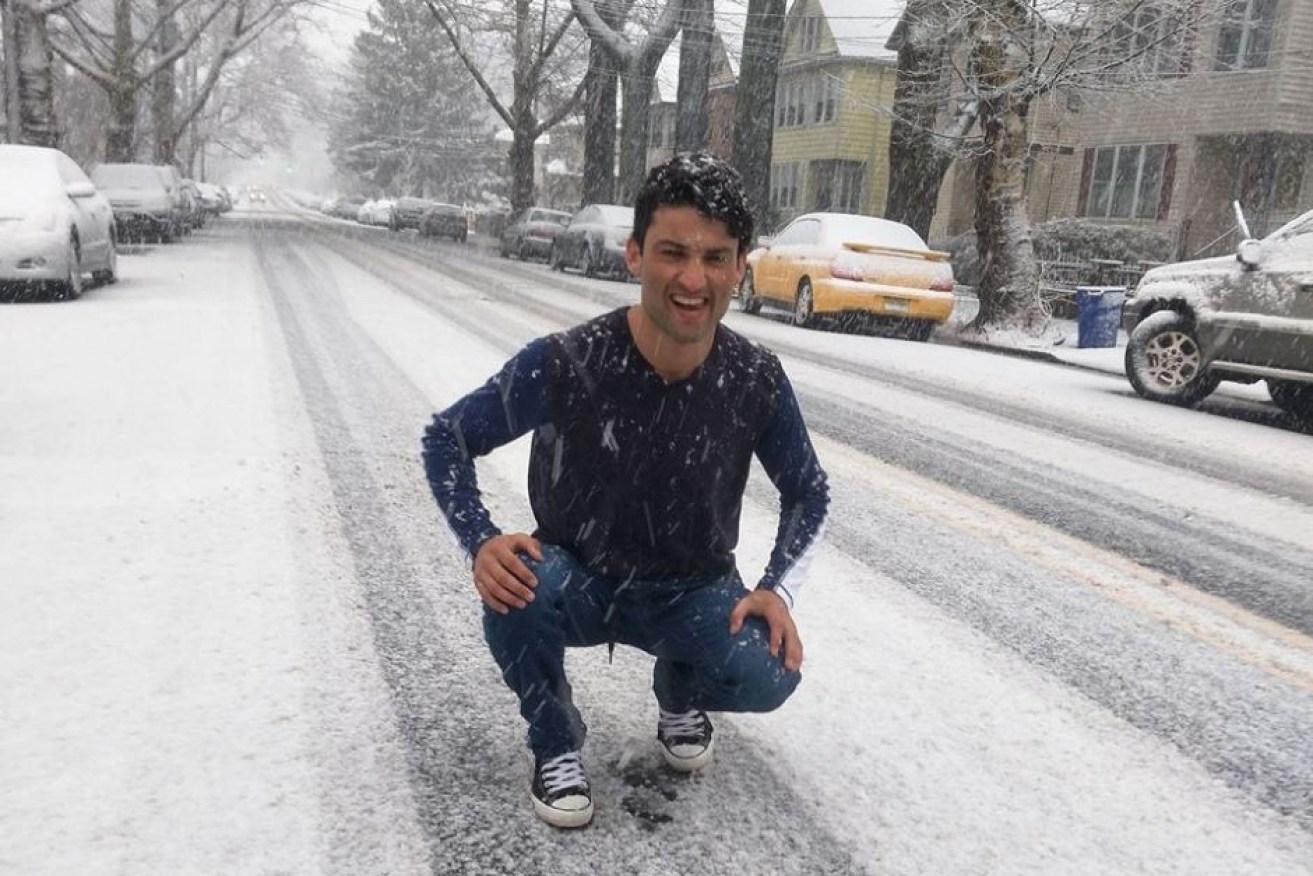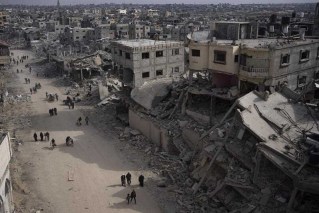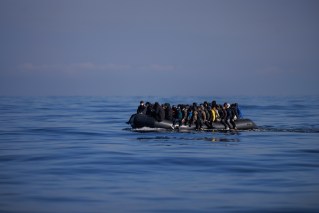Aussie expats join forces in Ads Up group to help refugees find their feet in the US

Shafiq Turi has come a long way, from Pakistan to New York via Manus. Photo: Facebook/Shafiq Turi
When Shafiq Turi arrived in New York last January it was the middle of winter. He had never seen snow before and had only a thin coat. He was completely alone and didn’t know a soul in the Big Apple.
All he wanted was a place to live and a job as a taxi driver. But as a refugee from Pakistan, who had just spent four years in the Australian-run Manus Detention Centre in Papua New Guinea, Shafiq was penniless and didn’t even know whether taxis or Ubers operated in New York.
When he first landed in the US, he was entitled to temporary accommodation and support from a local refugee agency. A “caseworker” took him grocery shopping.
But after three months, Shafiq was left to fend for himself. By chance he met an Australian expat, Ben Winsor, who lives in the US.
“He was absolutely thrilled to be free. It was infectious. I’ve never seen someone so happy in such a thin coat in such cold weather,” Mr Winsor said.

Shafiq with Australian Ben Winsor, who wanted to help him start a new life in the US.
“What struck me was how alien the United States was for him, what little information he was given before he arrived.”
Shafiq Turi is one of 300 refugees resettled in the US since last September from detention centres on Manus Island and Nauru, under a deal originally brokered between Australia and the former administration of Barack Obama.
Up to 950 more are expected to follow in the coming weeks and months.
Despite their number, most refugees have been sent alone — or as single families — to towns and cities scattered across the US, where they have limited social support networks. They have little or no choice in where they are sent to live.
Mr Winsor and another Australian in New York, Fleur Wood, began mobilising the “Aussie diaspora” to help them.
They set up a support group called Australian Diaspora Steps Up — or Ads Up — to help the Manus and Nauru refugees start a new life in the US, by offering financial assistance and social support.
“Shafiq was very independent, but still needed encouragement to leave his room and explore at first,” Mr Winsor said.
“I think there is a lot of fear of going out into the unknown in an alien country, when some of them first arrive. That can quickly give way to isolation and unhappiness if they don’t find a connection with their new community.”
Ads Up group pairing refugees with ‘buddies’
So far Ads Up has recruited more than 300 Australian expats — roughly one for each refugee settled in the US — to help them find employment, accommodation or English language classes, and navigate the health care and social security systems in a country where domestic refugee services have been slashed.
The support network aims to pair one Australian “buddy” for each refugee arriving from Manus or Nauru.

Co-founders of Ads Up, Ben Winsor and Fleur Wood, decided to mobilise the “Aussie diaspora” to help refugees.
“We’ve had situations where families of six, or four kids, have missed a social security payment and not been able to pay their rent, and facing eviction,” Mr Winsor said.
“We were able to step in and speak with a landlord and pay rent for that time to hold them over. We’ve had situations where people have needed urgent dental treatment, but of course that’s not covered under the medical system over here, so we have been able to scout around to find a dentist to help pro-bono.
“And people who have been sleeping on the floor when they arrived and not had anything — we’ve been able to send them a voucher to get some food, and mattresses so they’re not sleeping on hard wood floors.”
Mr Winsor and Ms Wood said there were about 100,000 Australians living in the US who knew what it was like to start a new life in a new country.
“We’re in a good position to help because we’re also outsiders in the US, trying to build a new life,” Mr Winsor said.
‘Why not reach out to someone?’
Another Australian, Alex Sherack, has become a support “buddy” for a Rohingya refugee from Myanmar, Mohammad Ayas, who was recently settled in Philadelphia.

Mohammad Ayas has been assisted by Alex Sherack in Philadelphia.
“I thought, why not reach out to someone who has moved to Philly, who needs help getting up off the ground,” he said.
“Might be looking for work, might be needing a hand setting up a bank account. And just culturally fitting into Philly and figuring out how it works. I thought I could add some value there.
“I’d never met this guy before. I just texted him a couple of times. And it was just really cool to hear his story … and hear exactly what he went through.
“It was really positive. Mohammad is a really chilled guy who just wants a chance to do something really awesome with his life.”
Nevertheless, Ms Wood said there had been some horror stories of caseworkers assigned to assist refugees suddenly abandoning them and leaving them to fend for themselves without the money or knowhow.
“Resources are thin,” the former fashion designer said.
“Refugees are expected to repay the costs of their flights from Manus and Nauru, so it can be pretty stressful for them.
“First in their home countries and then [in detention] these men, women and families have really been through hell.
“We just want to do what we can to help them recover and to offer them an Aussie welcome.”
In one case she said a newly arrived refugee woman was struggling with depression. Ads Up connected her with an Australian psychologist in the US.

Mohammad Ayas recently settled in Philadelphia from Myanmar.
Government policy makes knowing refugee arrivals tricky
Most of the 300 refugees settled so far under the Australia-US deal come from the Middle East, south Asia or Myanmar. Iranian refugees on Manus and Nauru have been mostly denied visas to settle in the US under the agreement, because of US President Donald Trump’s new immigration ban on migrants from key Muslim-majority nations, including Iran.
Some families have spent up to five years in detention and have children who were born on Manus or Nauru, who have never lived free in the broader community. Others live in towns or cities which lack a substantial community from their home country.

Most refugees have been sent to towns and cities scattered across the US, where they have limited social support networks.
“I’ll often google community groups or support services that are close to them, and I’ll make an effort to see if there’s say, a Pakistani community group or an Iranian community group or something there they can get in touch with. In many cases there are,” Mr Winsor said.
“Another thing, when it comes to finding jobs, sometimes if they apply to restaurants that are from the ethnicity they are from there’s a point of connection with them and the owners who want to help them out a bit more.”
Amnesty International estimates about 700 refugees and asylum seekers still live in PNG, mostly on Manus Island, after nearly five years in limbo.
Mr Winsor said knowing when the next group of refugees was about to leave Manus or Nauru was difficult, given the lack of any public information from the Australian government.
Ads Up monitors refugee support groups on Facebook to find out when and how many refugees are about to be settled in the US. The organisation has also taken out ads on both islands for detainees who know they are moving to the US to get in touch when they arrive.
Five months after he arrived, Shafiq Turi is still adjusting to his new life.
He said he always wanted to go to New York because he had heard it was so amazing. But the isolation from family or anyone he knows has proven too much.
A few weeks ago he moved to Philadelphia to be closer to a friend. But he remains optimistic and happy about life in the US.
On his Facebook page he posted a message that could well be directed at his former friends and other detainees still on Manus Island.
“Keep going, each step may get harder. But don’t stop. The view is beautiful at the top,” it said.
–ABC








